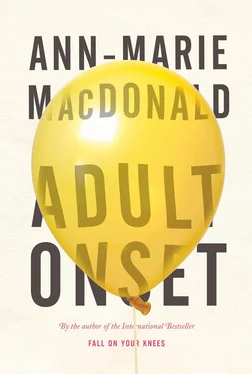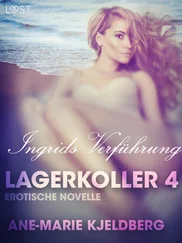“What’s up, Dad?”
“How are you feeling today, Kit-Kat?”
“Great.”
He hesitated, as if he didn’t know whether to believe her, before saying, “Good.”
“Don’t worry, Dad,” she reassured him.
He had taken her to a specialist for her spells, though Kitty had tried to tell him there was nothing to worry about. She liked Dr. Quinn, he gave her tests but not like the ones in school. The only thing that frightened Kitty was the hospital smell. It made her stomach chilly and put her skin on alert, as though at any moment someone might stick a needle into her or worse. But it was worth the smell and even the wasted worry on her father’s part just to have slid bodily into the big clanking tube that took pictures of her brain, layer after layer. She got to see them afterwards, on the doctor’s computer, blue maps and shadowy shapes …
“Where are we going this time?” she asked her father.
“Kitty, there is a trip in the offing, but I’m afraid I can’t accompany you on it.”
For one queasy moment, Kitty feared he was about to tell her that she was going to have to return to the Hospital for Sick Children for an operation … what if there really was something wrong with her brain? What if they had to cut open her head? The next instant, he interrupted what she thought was her worst nightmare, only to surpass it with one that involved no scalpels but nonetheless entailed a severing that she feared she could not survive.
He was sending her away.
If a Leaf Falls in a Fracture, Does Anyone Hear?
She has just returned with Maggie from a harrowing parents-and-tots swim class in the tepid pool at the community centre. The pallid dads and moms all bobbed about, clutching their eighteen-to-twenty-four-month-olds in controlled chaos under the eye of a teenaged instructor wearing nose plugs. Those parents with a hint of colour in their heritage looked especially unhealthy, any pigment-imparted gloss dulled by chlourescence — the Libyan dad got the worst of it. They all sang “Wheels on the Bus” and swam the gauntlet of “London Bridge,” chest hair streaming, arm flab jiggling and, in Mary Rose’s case, middle-aged sinews straining, while the tiny future-adults screamed or rejoiced according to their allotment of nature-nurture. Finally, the red plastic slide was produced that really separated the stamp collectors from the venture capitalists. Maggie dutifully waited her turn then clambered up the two steps — itself a risk-barnacled undertaking for any toddler — as Mary Rose slipped back into the water, poised to catch her. “Okay, Maggie!” And instead of going down on her bottom, Maggie dove straight at Mary Rose’s head. They went to the bottom butt-first, Mary Rose hanging on to Maggie and scrabbling for purchase on the slippery tiles. They finally shot to the surface with a sputtering laugh from Maggie, a heart-barfing gasp from Mary Rose and the stunned looks of the other parents.
“Maggie, you must go down on your bum next time.”
“Okay.”
She climbed the slide and did it again.
It is now 9:30 a.m. on that most innocuous of weekdays, Tuesday, and Mary Rose is safe in her kitchen. Her skin smells like chlorine and she has a bad case of hat-hair, but she is basking in gemütlichkeit —that untranslatable but universally recognized sense of well-being. The one that arises when you’ve cleared your inbox or survived a plane crash. Maggie is on the floor rearranging the Tupperware cupboard — it isn’t really Tupperware and Mary Rose will have to replace it all with BPA-free stuff anyhow. Perhaps she oughtn’t to allow Maggie to play with it, but she isn’t putting it in her mouth, so … Daisy appears and goes to her bowl where she hoovers a late breakfast with a series of grunts — the pooch is keeping dowager hours these days.
Mary Rose leans against her soapstone counter in front of her big kitchen windows and reads the Toronto Star —in the food section is an article about an ordinary woman who makes her own ricotta … and runs a corporation. Tuesday is Candace’s morning, she’ll be here soon — Mary Rose ought to get down on the floor and play with Maggie before she arrives. She closes the newspaper and in glancing up her eye is caught by a woman standing on the corner. She has a toddler by the hand and a baby in a stroller weighed down with grocery bags. She is trying to cross the street, but her toddler refuses. He sits. He cries. The mother waits — she is doing the right thing. The hard thing. Mary Rose has been there.
Recently she read in the paper about a woman who killed herself and her husband, and tried to kill their three young children. This happened a ten-minute walk away, on Harmony Street. The article mentioned a dog “found wandering at the scene.”
She looks at Daisy, out cold now in front of the sliding door to the deck, legs twitching — chasing a dream squirrel.
The article quoted a neighbour saying she saw the woman, “a nice, quiet young woman, they were a nice couple,” walking down the street from the Loblaws store, pushing her baby in the stroller, laden with grocery bags, her toddler and six-year-old in tow. “She had a blank look on her face.” Mary Rose recalls something her friend Andrea said — Andrea is a midwife, the one who “caught” Maggie. In the flush of that first hour when bliss had kicked in full force and they were still hugging and weeping and laughing, Andrea turned to Hilary. “I’m going to say to you what I say to every mother post-partum: three months from now when you want to throw that baby out the window, call me.”
What if someone had come up to the nice young woman from Harmony Street and said, “Can I help you with those bags?” Or was she already too far gone?
The children survived. The dog probably had something to do with that.
The mother tried to cut their throats.
It occurs to Mary Rose to go out there and help that woman; maybe she isn’t patient, maybe she is depressed. Maybe she is going to go home and murder those children, and it will be Mary Rose’s fault — she hears a rattling behind her. Maggie is shaking something in a plastic container … a penny! Hil was sorting pocket change before she left and dropped some on the kitchen floor. She swore she had picked it all up and now Maggie has it in her hand, halfway to her mouth, poised to choke on it.
“Here, luvvie, give the penny to Mumma.”
“No.” She closes her fist over it. “Mine.”
Mary Rose pries open the little hand and Maggie bops her in the face with the container.
Mary Rose rips the container from Maggie’s hand and hurls it down the hall, regretting the action even before the thing bounces harmlessly off the front door. The child screams as though she has just witnessed the evisceration of a pet rabbit.
“It’s okay, sweetheart, Mumma didn’t break it.”
She retrieves the container and returns it to Maggie, who promptly hurls it back down the hall. So much for the teachable moment. Hil is a worse mother for leaving pennies on the floor. Mary Rose lies down suddenly, pretending to be asleep, and lets Maggie wake her up over and over again. Soon the big brown eyes are wet with laughter and Mary Rose catches the child as she flings herself repeatedly at Mumma — the closest thing to a hug Maggie will consent to from her.
The back door opens, Daisy mwuffs and Candace walks up the four steps to the kitchen, already pushing up the sleeves of her skintight, long-sleeved T and exuding the air of cheerful authority that owes less perhaps to her training as a professional nanny than to her years as a Manchester barmaid. Daisy’s back-end fishtails in greeting, Maggie deserts her and runs to hug “Candies!” She watches as Maggie buries herself in Candace’s ample embrace and reflects that if she spent only hours a week with her child, perhaps Maggie would love her too — then catches herself; after all, she wants Maggie to love Candace. Mary Rose is just jealous — though whether of Candace or of Maggie, it is hard to say.
Читать дальше












